Daily Vocabulary Words: List of Daily Used Words
Hi there. Welcome to this special section @ Wordpandit.
Our endeavour here is straightforward: highlighting important daily vocabulary words, you would encounter in The Hindu. This is your repository of commonly used words; essentially, we are posting a list of daily used words. Hence, this has significant practical application as it teaches you words that are commonly used in a leading publication such as The Hindu.
Visit the website daily to learn words from The Hindu.
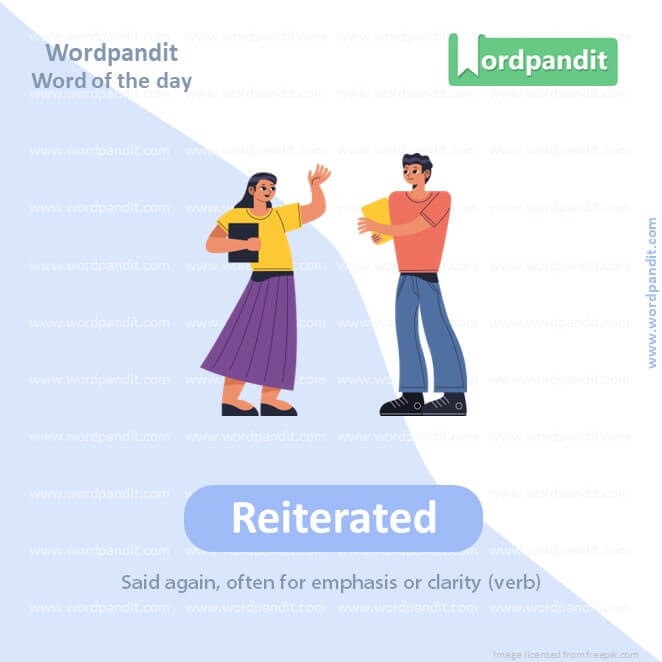
WORD-1: Reiterated
CONTEXT: The LDF government reiterated that the CAA and the National Register of Citizens will not be implemented in Kerala, Kerala Pradesh Congress Committee president K. Sudhakaran said that the CAA will be “thrown into the Arabian Sea” if India comes to power.
SOURCE: The Hindu
EXPLANATORY PARAGRAPH: Imagine you’re telling a story to your friends, and you want to make sure they remember an important part. So, you tell that part again and again to make it clear. When you repeat something like this, it’s called “reiterating.”
MEANING: Said again, often for emphasis or clarity (verb).
PRONUNCIATION: ree-IT-uh-reyt-ed
SYNONYMS: Repeat, emphasize, restate, echo, rehash
USAGE EXAMPLES:
1. The teacher reiterated the importance of studying for the upcoming exam.
2. She reiterated her commitment to the project during the team meeting.
3. The CEO reiterated the company’s goals in the quarterly report.
4. He reiterated his apology to make sure everyone understood it.
WORD-2: Quashed
CONTEXT: Mr. Vijayan responded saying 629 of these cases were quashed by the courts, and the government has already agreed to withdraw 84 others.
SOURCE: The Hindu
EXPLANATORY PARAGRAPH: Imagine you have a bug in your room, and you squash it with a shoe. The bug is gone, and you don’t have to worry about it anymore. When something is stopped or put to an end forcefully, like squashing a bug, it’s “quashed.”
MEANING: To suppress or extinguish something forcefully (verb).
PRONUNCIATION: kwosh
SYNONYMS: Suppress, squash, extinguish, defeat, annul
USAGE EXAMPLES:
1. The court quashed the lawsuit due to lack of evidence.
2. The government quashed the rebellion before it could gain momentum.
3. The manager quashed rumors about layoffs by issuing a statement.
4. Her determination quashed any doubts about her ability to succeed.
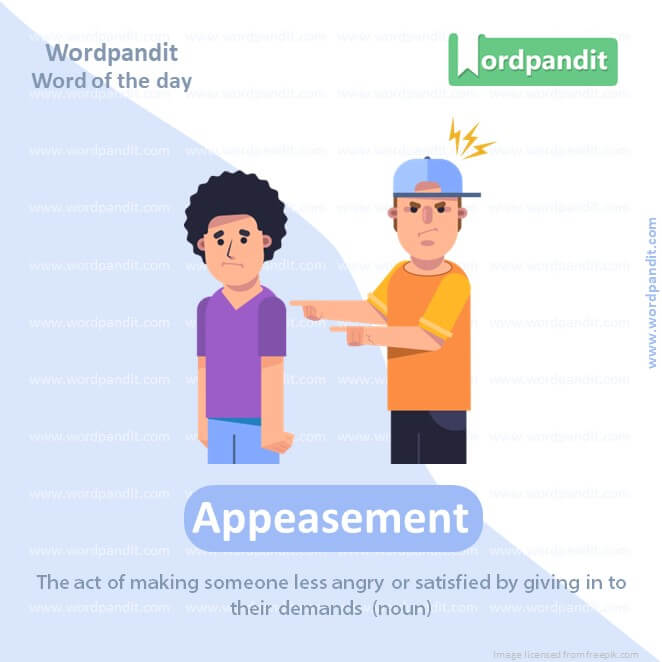
WORD-3: Appeasement
CONTEXT: BJP State President K. Surendran believes that the withdrawal of cases against anti-CAA protesters is part of the LDF’s attempts at minority appeasement.
SOURCE: The Hindu
EXPLANATORY PARAGRAPH: Imagine you have a friend who is upset because they didn’t get a turn to play a game. To make them feel better, you offer them your turn, hoping they’ll be happy again. This act of trying to make someone happy by giving in to their demands is called “appeasement.”
MEANING:The act of making someone less angry or satisfied by giving in to their demands (noun)
PRONUNCIATION: uh-PEEZ-muhnt
SYNONYMS: Conciliation, pacification, placation, concession, accommodation
USAGE EXAMPLES:
1. The government’s policy of appeasement failed to prevent the conflict.
2. The manager’s appeasement of the angry customer included a full refund.
3. Appeasement often leads to temporary calm but may not address underlying issues.
4. Diplomats engaged in appeasement strategies to avoid war.
WORD-4: Dangling
CONTEXT: Other than dangling a cheque book, Beijing seems risk averse and has few answers to long-standing geopolitical flashpoints.
SOURCE: The Hindu
EXPLANATORY PARAGRAPH: Imagine you have a toy hanging by a thread from the ceiling. It’s not attached properly, so it’s just hanging there, not secure. When something is hanging like this without support or connection, we say it’s “dangling.”
MEANING: Hanging or swinging loosely; not securely attached (adjective).
PRONUNCIATION: dang-guh-ling
SYNONYMS: Hanging, suspended, swinging, drooping, loose
USAGE EXAMPLES:
1. The chandelier had a few dangling crystals that needed to be fixed.
2. Her necklace had a dangling pendant that caught everyone’s attention.
3. The curtains were left dangling after the strong wind blew through the window.
4. The cat played with a dangling toy for hours.
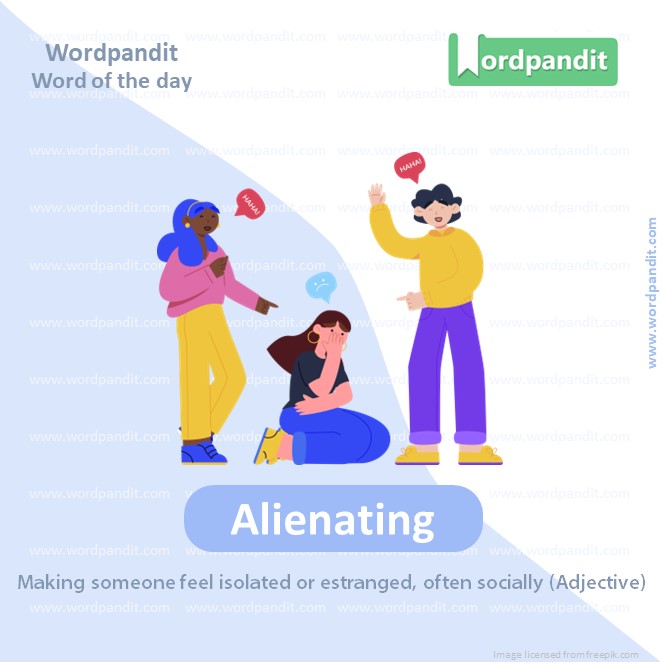
WORD-5: Alienating
CONTEXT: Beijing has taken a position that is clearly pro-Palestine, in line with its historical standing on the issue, alienating its relations with Israel.
SOURCE: The Hindu
EXPLANATORY PARAGRAPH: Imagine you’re playing with a group of friends, but then you start ignoring one of them and only play with the others. This friend might feel left out and sad. When you make someone feel like they don’t belong or aren’t welcome, it’s called “alienating” them.
MEANING: Making someone feel isolated or estranged, often socially (Adjective)
PRONUNCIATION: EY-lee-uh-ney-ting
SYNONYMS: Isolating, estranging, excluding, ostracizing, distancing
USAGE EXAMPLES:
1. His rude behavior was alienating his coworkers.
2. The policy changes had the unintended consequence of alienating customers.
3. She felt alienating stares from strangers in the unfamiliar town.
4. The divisive rhetoric was alienating supporters from both sides.
WORD-6: Embattled
CONTEXT: Israel’s embattled Prime Minister Benjamin Netanyahu aired the fact last year that China had invited him for a state visit.
SOURCE: The Hindu
EXPLANATORY PARAGRAPH: Imagine you’re playing a game where you have to defend your castle against enemies attacking from all sides. You’re surrounded, and it’s a tough situation. When someone or something is in a difficult or challenging situation like this, we say they are “embattled.”
MEANING: Engaged in or characterized by conflict or struggle (adjective).
PRONUNCIATION: em-BAT-uhld
SYNONYMS: Besieged, beleaguered, troubled, challenged, under fire
USAGE EXAMPLES:
1. The embattled company faced financial difficulties due to market changes.
2. The embattled leader fought to maintain control amidst political turmoil.
3. The embattled community rallied together in times of crisis.
4. Her embattled expression showed the stress she was under.
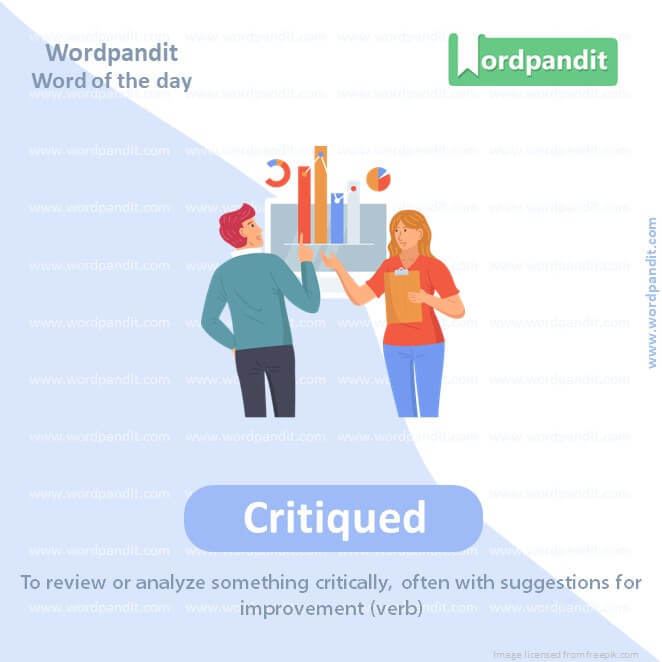
WORD-7: Critiqued
CONTEXT: It has since been crystallised, refined, developed, and critiqued to the point where it has become an inseparable part of equality jurisprudence.
SOURCE: The Hindu
EXPLANATORY PARAGRAPH: Imagine you’ve drawn a picture, and you show it to someone for their opinion. They look at it carefully and tell you what they like and what could be better. When someone gives feedback or comments on something, pointing out its strengths and weaknesses, they are “critiquing” it.
MEANING: To review or analyze something critically, often with suggestions for
improvement (verb).
PRONUNCIATION: kri-TEEKD
SYNONYMS: Analyze, assess, review, evaluate, examine
USAGE EXAMPLES:
1. The teacher critiqued the students’ essays for grammar and content.
2. He critiqued the movie, highlighting its strengths and weaknesses.
3. The art critic critiqued the new exhibition at the gallery.
4. She asked her friends to critique her presentation before the conference.
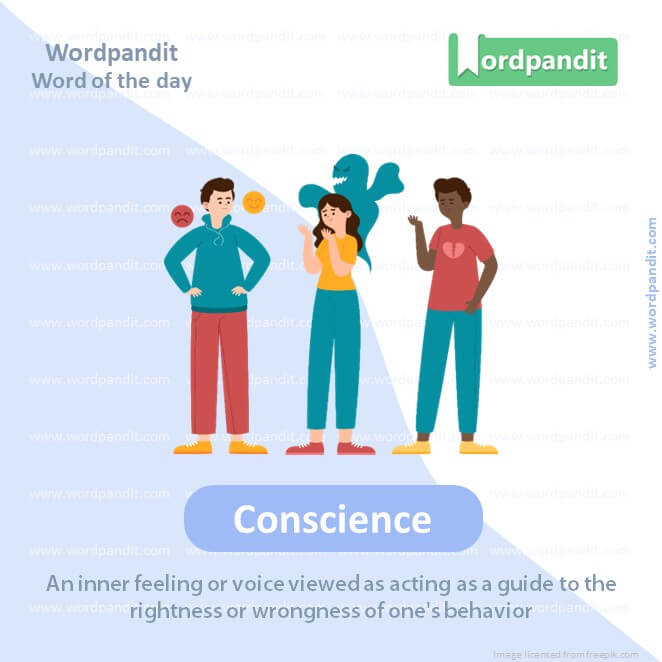
WORD-8: Conscience
CONTEXT: The CAA may pass this test, and yet not satisfy our constitutional conscience.
SOURCE: The Hindu
EXPLANATORY PARAGRAPH: Imagine you’re about to do something you know is wrong, like taking a cookie from the jar without asking. But then a little voice inside your head tells you it’s not right. That little voice that helps you know the difference between right and wrong is called your “conscience.”
MEANING: An inner feeling or voice viewed as acting as a guide to the
rightness or wrongness of one’s behavior.
PRONUNCIATION: KON-shuhns
SYNONYMS: Moral sense, ethics, principles, sense of right and wrong, integrity
USAGE EXAMPLES:
1. Her conscience wouldn’t allow her to cheat on the exam, even though others were doing it.
2. He followed his conscience and reported the unethical behavior to the authorities.
3. The decision weighed heavily on his conscience, knowing it would affect many people.
4. She acted in accordance with her conscience, even when it was difficult.
WORD-9: Unsettling
CONTEXT: This is unsettling also because the discrimination here is on the basis of religion, which is against any understanding of secularism.
SOURCE: The Hindu
EXPLANATORY PARAGRAPH: Imagine you’re in a room where everything feels calm and safe, but suddenly something happens that makes you feel nervous or uncomfortable. That feeling of being disturbed or unsure about what’s happening is called “unsettling.” It’s like saying something makes you feel uneasy or anxious.
MEANING: Causing feelings of discomfort, unease, or disturbance (adjective).
PRONUNCIATION: uhn-SET-ling
SYNONYMS: Disturbing, unsettling, disconcerting, troubling, unnerving
USAGE EXAMPLES:
1. The strange noise in the dark hallway was unsettling for the residents.
2. The unsettling news about the economy made investors nervous.
3. His behavior during the meeting was unsettling to the rest of the team.
4. The sudden change in plans was unsettling for everyone involved.
WORD-10: Apparent
CONTEXT: The source of our pain is the fact that there are some persecuted minorities who are excluded for no apparent reason.
SOURCE: The Hindu
EXPLANATORY PARAGRAPH: Imagine you’re looking at a tree in the distance. Even though you can’t see the details of the leaves or branches, you can still tell there’s a tree because of its outline and shape. That’s because it’s “apparent” to you that there’s a tree there, even if you can’t see all the details clearly.
MEANING: Easily seen or understood; obvious or clear (adjective).
PRONUNCIATION: uh-PAR-uhnt
SYNONYMS: Clear, obvious, evident, manifest, conspicuous
USAGE EXAMPLES:
1. The effects of climate change are becoming increasingly apparent.
2. It was apparent from her expression that she was not happy with the decision.
3. The apparent lack of progress in the project raised concerns among the stakeholders.
4. His apparent disregard for safety protocols was a cause for alarm.
Vocabulary list
In navigating the seas of language learning, a ‘vocabulary list’ can often be a dependable guiding star. These collections of words serve as a focused learning tool, yet the technique of mastering a ‘vocabulary list’ effectively requires more than simple perusal. It calls for a smart, sustained approach that amalgamates understanding, memory, and application.
Exploring a ‘vocabulary list’ should be more than a one-way trip. It ought to be more like a round trip, wherein you learn the words, come back to review them, and then set out again for a new voyage. This repeated interactive way of exploring the ‘vocabulary list’ aids in solid memory retention and effective learning.
Next, while dealing with a ‘vocabulary list’, employing memory-boosting techniques can bolster your retention substantially. Here, mechanisms like spaced repetition systems and flashcards can simplify and streamline the process. Moreover, associating words on your ‘vocabulary list’ with visual cues or personal stories can help your brain make strong connections, strengthening your recall ability.
However, the most crucial aspect of learning from a ‘vocabulary list’ is active application. Conquering a list without using the words in real-world contexts might leave you with fleeting knowledge. Hence, make it a point to integrate these learnt words into your daily interactions, be it on social media, in email exchanges, or casual conversations. The regular utilization reinforces your understanding and brings the ‘vocabulary list’ to life.
Conclusively, the ‘vocabulary list’ is a treasure trove in a language learner’s quest, waiting to be unlocked strategically. Through the trinity of review, memory-enhancing techniques, and active application, one can master any ‘vocabulary list’. So, take charge of your learning journey and set sail with your ‘vocabulary list’, charting the vast and fascinating seas of language.











